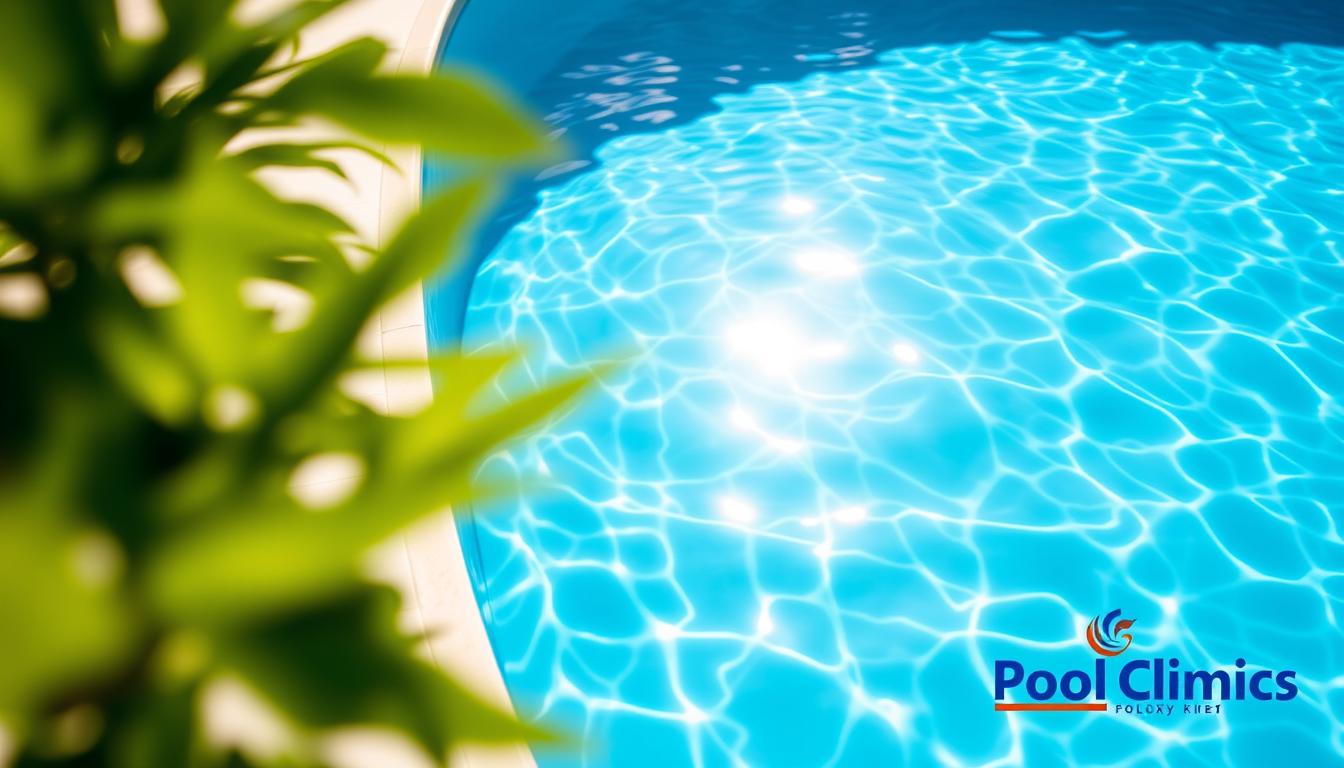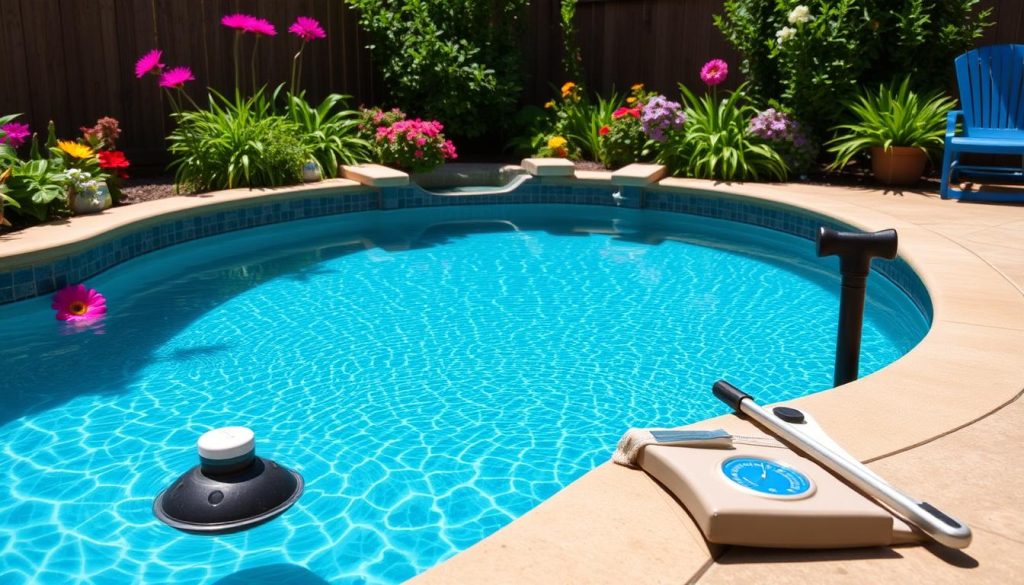
Summer’s here, and it’s time for backyard pool fun! Small pools need special care. Clean, safe water is key for family enjoyment.
Small pools differ from large ones in upkeep. They need less chemicals and cleaning. But neglect can lead to unsafe conditions.
Our guide makes small pool care simple. You’ll learn easy ways to keep water crystal clear. Get ready for a summer of safe, clean swimming!
Key Takeaways
- Small pools require less frequent water testing, chemical dosing, and cleaning compared to larger pools
- Maintain a pH between 7.4-7.6 and a free chlorine level of 1-3 ppm for optimal water quality
- Regular draining and refilling of kiddie pools are recommended, especially if no filter pump is used
- Adding a small amount of baking soda can help balance the pH of the water for safer swimming
- Ensure children rinse off dirt and debris before entering the pool to keep the water clean
- Implement a daily cleaning routine and use the right tools for effective debris removal
- Properly store and secure pool chemicals in a locked area for safety
Understanding the Basics of Small Pool Maintenance
Small pools need special care compared to larger ones. The basics stay the same, but smaller water bodies need a unique plan. Let’s explore how to keep kiddie pools safe and fun for little swimmers.
Size and Capacity Considerations
Small pools hold less water than big ones. This means the water heats up faster on hot days. Quick water quality checks are crucial to stop harmful bacteria and algae growth.

Kiddie pools come in many sizes. They range from tiny inflatable ones to larger pools for several kids. Knowing your pool’s size helps set the right cleaning schedule and chemical amounts.
Water Quality and Maintenance Requirements
Clean water is vital in small pools due to limited volume. Stagnant water can be dangerous, so keep it fresh. Test water chemistry often, including pH, alkalinity, and chlorine levels.
Use the right amount of chemicals in small pools. Too much can irritate skin and eyes. Add a bit of baking soda to balance pH levels for comfortable swimming.
Practical Tips for Usage
Keep small pools clean with some easy steps. Have kids rinse off before swimming to reduce dirt. Watch how children use the pool and keep pets away to prevent bacteria.
If a child has an accident, drain and refill the pool. Most kiddie pools have easy-to-use drain plugs. Use a garden hose to refill it quickly.
Empty the pool after each use and let it dry in sunlight. This stops mold and mildew growth, keeping the pool ready for next time.
| Pool Size (Gallons) | Recommended Chlorine (ppm) | pH Range |
|---|---|---|
| 50-100 | 1-2 | 7.2-7.6 |
| 100-200 | 1-3 | 7.2-7.6 |
| 200-500 | 1-3 | 7.4-7.6 |
Follow these small pool care tips for a safe splash zone. Your kids will enjoy cool, clean fun all summer long.
Effective Strategies for Maintaining Crystal Clear Water
Clear water is vital for a safe and fun swimming experience. We’ll explore daily checks, cleaning routines, and water quality management. We’ll also cover weekly deep cleaning and seasonal maintenance tasks.
Daily Inspection and Cleaning Routines
Start by checking the pool surface and surrounding areas daily. Remove debris like leaves and insects with a skimmer or net. This prevents organic matter from sinking and affecting water clarity.
Secure the pool cover when not in use. This reduces debris buildup and slows evaporation.
Water Quality Management Techniques
Regular water testing is key for clear pool water. Use a reliable kit to check chlorine levels and pH balance. The ideal pH range is 7.4 to 7.6.
Add chemicals gradually when needed. Retest the water to avoid over-chlorination, which can irritate skin.
| Parameter | Recommended Range | Testing Frequency |
|---|---|---|
| pH | 7.4 – 7.6 | Twice a week |
| Chlorine | 1 – 3 ppm | Twice a week |
| Alkalinity | 80 – 120 ppm | Once a week |
| Calcium Hardness | 200 – 400 ppm | Once a month |
Weekly Deep Cleaning Procedures
Perform a thorough cleaning once a week to prevent algae and bacteria growth. Drain the pool completely and scrub all surfaces to remove slime or algae.
Check for signs of wear or damage that could affect the pool’s structure. After cleaning, refill with fresh water and inspect the filter system.
Seasonal Maintenance Tasks
At season’s end, prepare your pool for storage with a final cleaning. Ensure it’s completely dry to prevent mold and mildew growth during off-season.
For inflatable pools, proper drying and storage are crucial. This maintains their condition and extends their lifespan.
By dedicating ourselves to these essential maintenance tasks, we can enjoy a crystal clear and inviting small pool throughout the swimming season, providing a safe and enjoyable experience for our family and friends.
How to Keep Small Pool Clean: Essential Tools and Techniques
Keeping a small pool clean requires proper tools, techniques, and consistent maintenance. We’ll explore essential aspects of maintaining a sparkling clean pool. This includes safe chemical use, natural alternatives, and effective debris removal strategies.
Safe Use of Chemicals for Sanitization
Chlorine and bleach are common pool sanitizers. They kill bacteria and control algae growth. Always dilute chemicals according to instructions and pool volume. Allow water to circulate before swimming.
Regular water testing is crucial for safety. Use a reliable kit to check pH, chlorine, and alkalinity levels. Aim for a pH between 7.2 and 7.8. Keep chlorine levels between 1 and 3 ppm.
Natural Alternatives for Maintaining Water Quality
White vinegar is a natural alternative to harsh chemicals. It disinfects and controls algae without chlorine’s side effects. Add one cup per 100 gallons of pool water. This method works well for kiddie pools with limited water volume.
Effective Debris Removal Strategies
Regular pool skimming is crucial for clean water. Use a net or your hand to remove leaves and bugs. This reduces the need for chemical treatments.
A pool skimmer or leaf net makes debris removal more efficient. Using a pool cover when not in use minimizes debris. This is especially helpful for exposed above-ground pools.
Cautions and Best Practices for Chemical Use
Safety is paramount when using pool chemicals. Never mix different chemicals together. This can cause dangerous reactions. Dilute chemicals separately before adding them to the pool.
Always verify chemical levels before swimming. Use a reliable test kit to check pH, chlorine, and alkalinity. Regular testing ensures a safe and comfortable swimming environment.
Remember, the key to a clean and safe small pool is a consistent maintenance routine that combines regular debris removal, proper chemical use, and ongoing water quality monitoring.
| Task | Frequency | Tools/Products |
|---|---|---|
| Skimming | Daily | Pool skimmer, leaf net |
| Water Testing | Weekly | Water test kit |
| Chemical Treatment | As needed | Chlorine, bleach, or white vinegar |
| Pool Cover | When not in use | Fitted pool cover |
Follow these guidelines and use the right tools. Your small pool will stay clean and safe. It’ll be an enjoyable oasis for you and your loved ones all season long.
Conclusion
A clean kiddie pool ensures safe, fun swimming for children. Understanding maintenance basics, using effective cleaning methods, and handling chemicals safely keep pools hygienic. Regular upkeep, including daily checks and weekly deep cleans, preserves pool longevity.
With proper tools and consistent care, you’ll create a backyard oasis for family fun. Maintain pH between 7.2-7.6 and sanitizer levels at 1-4 ppm. Shock the pool as needed for clear water.
Investing in pool maintenance brings peace of mind and happy kids. Stay proactive to create a safe, inviting environment for swimming. Your efforts will encourage children to love water activities.
A well-maintained kiddie pool offers endless joy and memorable moments. By following these tips, you’ll ensure your pool remains a source of laughter and splashes. Embrace this responsibility and enjoy your backyard swimming oasis.







